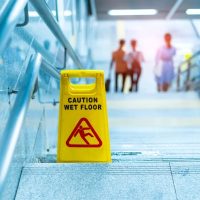How Do You Prove “Constructive Knowledge” in an Indiana Slip and Fall Case?

Premises liability cases often involve people injured in slip-and-fall accidents while visiting a store, restaurant, or other business that is normally open to the public. Business owners are not necessarily liable for every such accident that occurs on their premises. Rather, the law generally requires proof that a particular slip and fall was the result of a hazard that the owner had “actual” or “constructive” knowledge of beforehand.
Actual knowledge is just what it sounds like: The business owner, or more often their employees, knew there was a hazard yet failed to take corrective action. Constructive knowledge is a more abstract concept. It requires proof that the business should have known there was a problem even if they did not have actual knowledge. One way to prove constructive knowledge is to show that the business had, but did not follow, a policy of regularly inspecting their premises for potential hazards, such as liquid spills, that might reasonably injure a customer.
Truck Stop, Contractor Face Lawsuit Over Flooded Temporary Bathroom
Another sign of constructive knowledge is that the business owner knew of a prior history of hazards similar to the one that injured the slip-and-fall victim. A recent decision from the Indiana Court of Appeals, Peterson v. Love’s Travel Stops & Country Stores, Inc., provides a helpful illustration. In this case, the plaintiff visited a Love’s truck stop in Memphis, Indiana. At the time, Love’s was in the process of remodeling the bathroom at the Memphis location, so its general contractor erected a temporary bathroom in a trailer, which the plaintiff used.
While exiting the temporary bathroom trailer, however, the plaintiff slipped and fell on what he alleged was about one inch of water on the floor. The plaintiff later testified that just after his fall, he heard the truck stop manager tell one of his bosses over the phone, “I told you about the water on the floor, now I have a man on the ground.”
Just over a year later, the plaintiff filed a personal injury lawsuit against Love’s and its general contractor, alleging they were liable for a knee injury he suffered in the fall. Both defendants moved to dismiss the case at the summary judgment stage. Love’s argued it had no actual or constructive knowledge of the water on the bathroom floor. The contractor maintained it had no legal responsibility for the temporary bathroom. The trial court accepted both arguments and dismissed the case.
The Court of Appeals reversed, however, finding the plaintiff presented sufficient evidence to present his case to a jury. With respect to Love’s, the appellate court credited the plaintiff’s testimony regarding the manager’s conversation that suggested there were known issues with water leakage in the temporary bathroom. As for the contractor, the plaintiff presented evidence that it acted as a “middleman” between Love’s and the subcontractor that installed the temporary bathroom, so it could be liable for any failure to properly maintain the trailer prior to the plaintiff’s accident.
Contact a Madisonville Premises Liability Lawyer Today
A slip and fall on a wet floor can lead to serious, even life-threatening injuries. That is why it is so critical to hold negligent property owners accountable when they allow unsafe conditions to hurt their customers. If you need to speak with a Madisonville premises liability attorney, contact Whitfield Crosby & Flynn today to schedule a free consultation. We have offices in Madisonville, Kentucky; Chattanooga, Tennessee; and Indianapolis, Indiana.
Source:
scholar.google.com/scholar_case?case=8560251054335271031
